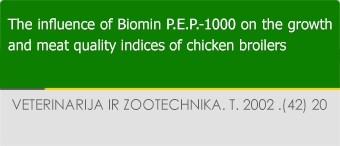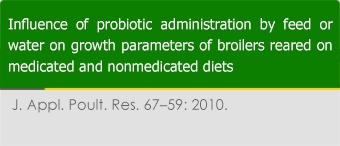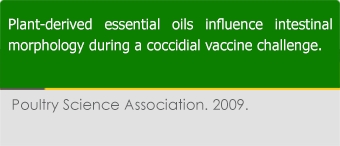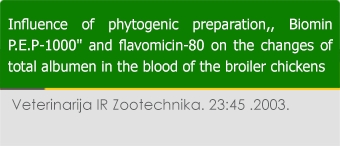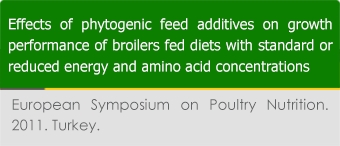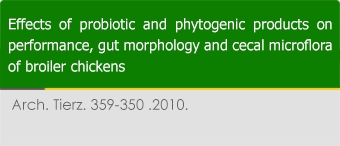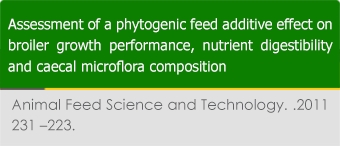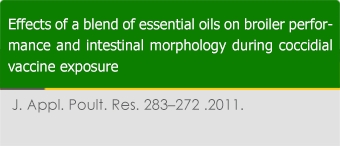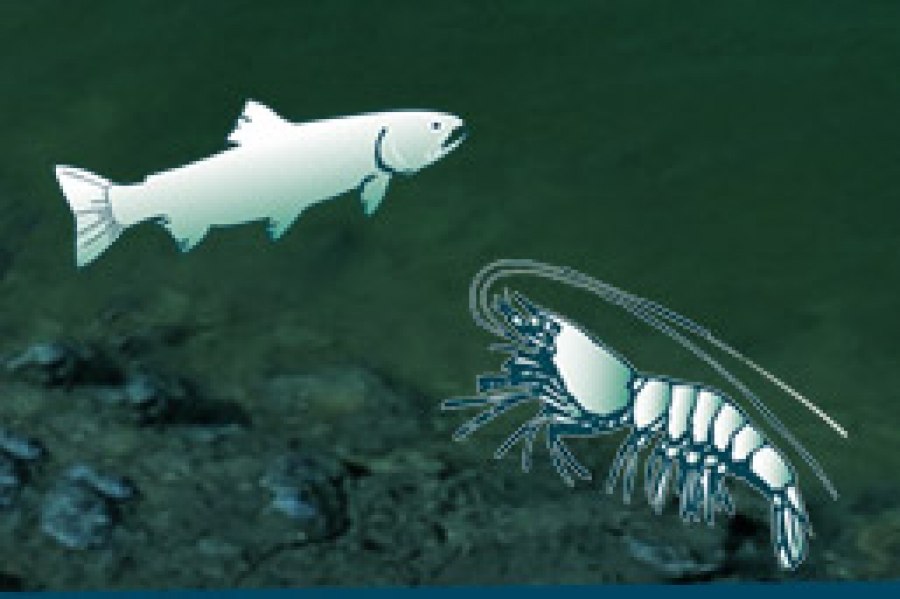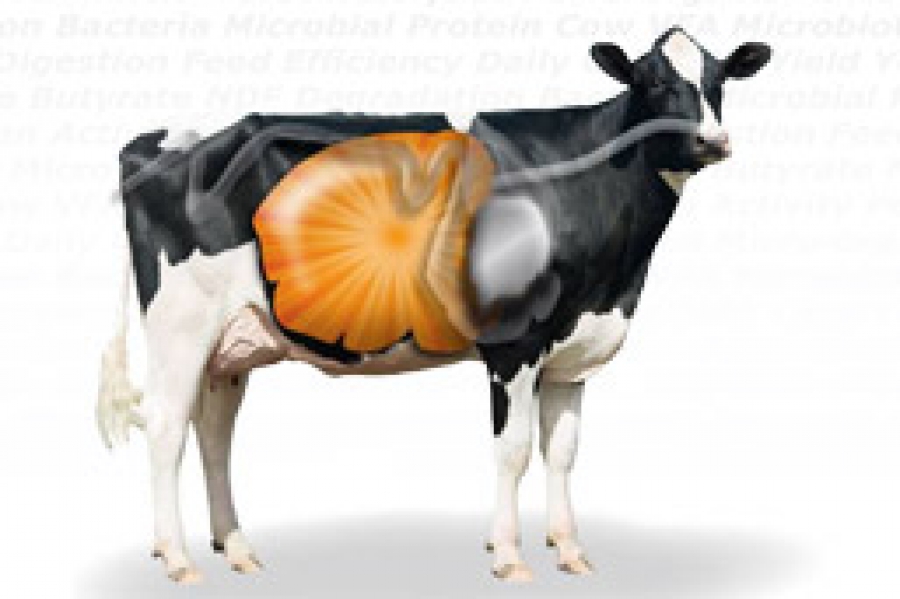Priudokiene, V., D. Gudaviciute
The effect of phytogenic preparation Biomin P.E.P.-1000 on the growth of chicken broilers was analysed. The active component of Biomin P.E.P.-1000 is a herbal formula consisting of phytobiotics and polyfructosans. All active substances in this preparation are of plant origin, which do not cause antibiotic resistance and do not leave residues in animal products. The investigation was carried out with broilers Cross Hibro-G at 1 - 42 days of age in Poultry Farm “Vilniaus paukštynas” and in the Research Laboratory of Biological Diversity and Technologies, Vilnius Pedagogical University. The experiment was held with three groups of broilers and every group contained 100 chickens. The chickens of the control group received antibiotic Flavomicin-80 in their diet. The chickens of the other two groups
Eckert, N. H., J. T. Lee, D. Hyatt, S. M. Stevens, S. Anderson, P. N. Anderson, R. Beltran, G. Schatzmayr, M. Mohnl, and D. J. Caldwell
Two separate performance trials were conducted to determine the effects of postpelleting feed or drinking water application of a Lactobacillus-based probiotic, alone or in combination with a phytogenic product, on growth parameters of broilers fed medicated or nonmedicated diets. Trial 1 consisted of 1,000 straight-run broilers that were randomized, placed in floor rearing pens, and fed medicated diets. At the conclusion of the experiment, BW of broilers receiving the probiotic were not different (P > 0.05) when compared with control broilers. In trial 2, stocking densities were increased to simulate local industry rearing practices, resulting in a total placement of 1,880 chicks in the same rearing facility. Broilers in trial 2 were fed nonmedicated diets. Broilers administered the probiotic by
N. Reisinger, T. Steiner, S. Nitsch, G. Schatzmayr, and T. J. Applegate
Because of pending and current regulations, the poultry industry is searching for alternatives to growth promoting antibiotics which may include plant-derived supplements which may prevent or lessen the severity of coccidiosis. Therefore, a 2 x 2 experiment (8 pens / treatment, 26 birds / pen) was conducted with 2 doses of a coccidial vaccine (1X or 5X; Paracox® 5 administered at 1 d of age) with or without supplementation (125 g/1000 kg) with a phytogenic feed additive containing essential oils from oregano, anis and citrus peel (Biomin®P.E.P. 125 poultry). Within each pen, 13 birds received the coccidial vaccine while the remainder was naturally infected through recycling of oocytsts in the litter. One of the naturally infected birds/pen was euthanized for histological evaluation of the mid-ileum
K. C. Mountzouris, P. Tsirtsikos, G. Papadomichelakis, G. Schatzmayr and K. Fegeros
Three dietary combinations of probiotics and phytogenics administered sequentially or continuously were assessed for their effects on broiler performance, nutrient digestibility, caecal microbiota composition, volatile fatty acid (VFA) pattern and plasma total antioxidant capacity (TAC). One-day-old Cobb male broilers (n = 525) were allocated to five experimental treatments for 42 days. Each treatment had three replicates of 35 broilers each. Depending on the time-frame of sequential or continuous addition in the basal diet (BD) of the probiotics (108 CFU/kg BD) and phytogenics (125 mg/kg BD), experimental treatments were: control (no additions, Days 1–42); PE1, probiotic Days 1–14 and phytogenic Days 15–42; PE2, probiotic Days 1–28 and phytogenic Days 29–42; PE3,
Sirvydis v., Sabalionyte R., Bobiniene R., Gruzauskas R.
The aim of the research is to investigate the influence of phytogenic preparation „Biomin P.E.P – 1000“, which is of a natural origin, on the processes of albumen metabolism in the organism of broiler chickens. Biomin P.E.P – 1000 positively stimulates the activity of the alimentary tract of broiler chickens as well as a composition of intestine micro flora, consequently that conditions better digestion of nutrient substances. 3 groups of broiler chickens were researched. The chickens of the first group were fed with the feed mixture, containing a feeding antibiotic Flavomicin-80, in the feed of the second group of chickens a feeding antibiotic Flavomicin – 80 was replaced by a dry phytogenic preparation „Biomin P.E.P–1000“, and in the drinking water of the chickens of the third group a liquid phytogenic preparation,
Tobias Steinera, Lidija Peric, Sinisa Bjedov, Niko Milosevic
The effects of dietary supplementation with two phytogenic feed additives (PFA) on performance parameters were investigated using 1200 mixed sex broilers fed standard diets or diets with reduced energy and amino acid concentrations. Birds were assigned to 6 treatments with 5 replications each and either fed a standard basal diet or a re-formulated basal diet with 1.5% reduced energy and amino acid concentrations. Treatments were: (1) Standard diet; (2) as 1 + PFA-1; (3) as 1 + PFA-2; (4) Re-formulated diet; (5) as 4 + PFA-1; (6) as 4 + PFA-2. PFA-1 was a blend of essential oils from oregano, anise and citrus adsorbed to an organic carrier (dosage: 0.125 g/kg) and PFA-2 was blend of essential oils from oregano, thyme, anise and citrus, encapsulated in a carbohydrate matrix (dosage: 0.1 g/kg).
L. Peric, N. Milosevic, D. Zikic, S. Bjedov, D. Cvetkovic, S. Markov, M. Mohnl and T. Steuner
The trial involved 684 Cobb 500 broiler chicks in order to investigate the effects of probiotics and phytogenic additives on performance, gut morphology and cecal microbial concentrations. Birds were assigned to three treatments: control feed, treatment with addition of probiotics in feed and water and treatment with addition of phytogenic blend in feed. The results showed a significant improvement (P<0.01) in body weight gain and a numerical, but non significant (P>0.05) improvement in feed conversion ratio by adding both probiotics and phytogenics in feed. There were no statistically significant differences among treatments regarding total aerobes, anaerobes, lactic acid bacteria, bifidobacteria, enterococci, and Escherichia coli populations (P>0.05) in cecum of broilers.
K.C. Mountzourisa, V. Paraskevas, P. Tsirtsikos, I. Palamidi, T. Steiner, G. Schatzmayr, K. Fegeros
The aim of this work was to evaluate the effect of three inclusion levels of a phytogenic feed additive (PFA) comprising a blend of essential oils from oregano, anise and citrus on broiler growth performance, nutrient digestibility and caecal microflora composition. Five hundred and twenty-five, 1-day-old, male Cobb broilers received a maize–soybean meal basal diet (BD) and depending on the type of addition were allocated in the following five experimental treatments for 6 weeks: BD–no additives (C), BD containing 80 mg PFA/kg diet (E1), BD containing 125 mg PFA/kg diet (E2), BD containing 250 mg PFA/kg diet (E3) and BD containing avilamycin at 2.5 mg/kg diet (A). Treatment A was used as a positive control due to the well-known function of avilamycin as an antimicrobial growth promoter in poultry.
N. Reisinger, T. Steiner, S. Nitsch, G. Schatzmayr, and T. J. Applegate
A 2 × 2 factorial experiment (8 pens/treatment, 26 birds/pen) was conducted with 2 doses of a coccidial vaccine [1× or 5× (Paracox-5, Schering-Plough Animal Health, Uxbridge, UK)], administered at 1 d of age) with or without supplementation (125 g/1,000 kg) with a phytogenic feed additive containing a blend of essential oils from oregano, anise, and citrus peel [Biomin P.E.P. 125 poultry (Biomin GmbH, Herzogenburg, Austria); EO]. Within each pen, 13 birds received the coccidial vaccine, whereas the remainder were naturally exposed through the recycling of oocysts in the litter. In pens of birds receiving the higher (5×) dosage of coccidial vaccine, the BW of broilers decreased by up to 2.7% (P = 0.08), but feed-to-gain ratio (FCR) and mortality at 27 d of age (P > 0.05) were not affected.



